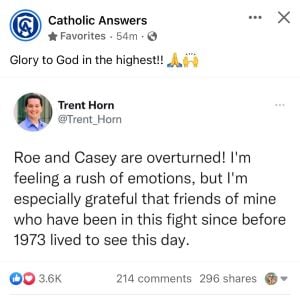 I really don’t have the mental energy right now to dive deep into the cluster—, um, “mess,” that is the Dobbs v. Jackson Women’s Health Organization decision that was released last Friday, June 24. For a snapshot of my mental space right now in the wake of this decision, I’ll share with you a brief post I wrote on my personal Facebook page on the day of the decision. Against a blue background and flying snow, I wrote, “For most of my adult life, I believed I would celebrate the end of Roe if it happened in my lifetime. Today, all I feel is angry grief for American women and their children.”
I really don’t have the mental energy right now to dive deep into the cluster—, um, “mess,” that is the Dobbs v. Jackson Women’s Health Organization decision that was released last Friday, June 24. For a snapshot of my mental space right now in the wake of this decision, I’ll share with you a brief post I wrote on my personal Facebook page on the day of the decision. Against a blue background and flying snow, I wrote, “For most of my adult life, I believed I would celebrate the end of Roe if it happened in my lifetime. Today, all I feel is angry grief for American women and their children.”
A former colleague asked me, sounding sincerely puzzled, if I wished abortion was legal and wanted to know what I would have preferred to have happened. I wrote, in response:
Abortion was legal; still is, in most places in this country, for the moment. What I wish is that Roe hadn’t been overturned by evil means. And make no mistake: the skulduggery used to end Roe, by a GOP Senate and a corrupt POTUS packing SCOTUS with their handpicked puppets, was evil. If you’re going to tell me that at least something good was achieved, remember that the Church teaches that good ends don’t justify evil means.
Will some children live who might otherwise die? Yes, probably. And there will also be a not insignificant number of women and children who will die who might otherwise have lived.
Lest you think I’ve completely dropped the pro-life part of my self-identification as a “pro-choice, pro-life Catholic,” I clarified elsewhere: “Had elective abortion ended as the result of positive social rejection of it as a solution to crisis pregnancy, I’d feel a lot differently today. It was the power plays and skulduggery that are a primary reason I am spitting nails.”
I wasn’t in the mood to argue further, and thankfully my erstwhile colleague (who has remained a social media friend) chose to move on from the discussion, a favor I appreciated. But the discussion did get me to wondering about how the news was being received at Catholic Answers. I decided to keep an eye out for their public responses.
As it happened, I first learned that Roe had fallen from Catholic Answers. CA’s social media manager threw up a Facebook post with a screencap of a tweet from staff apologist Trent Horn. “Glory to God in the highest!!” the social media guru exulted over Trent’s own reaction: “Roe and Casey are overturned! I’m feeling a rush of emotions, but I’m especially grateful that friends of mine who have been in this fight since before 1973 lived to see this day.”

Who is being centered here? Well, let’s see. There is a perfunctory shout-out to God, but CA chose to center Trent and Trent chose to center his friends. No mention of anyone who might be personally affected by this decision. It’s just a touch-down dance in the end zone.
“Now, Michelle,” you might be saying, “you’re being rather harsh aren’t you? It’s a brief reaction tweet and re-post. No need to draw any deep meaning from it.” Okay, fine, but you should know that Catholic Answers did treat this celebratory tweet as more than just a quick reaction on a day they were expressing their happiness. When I checked out their FB page to confirm the post is still public (as of this writing), I found they’d pinned it to the top of their wall. It’s since amassed over 11,000 Likes and Loves, over a thousand comments, and over seven hundred shares. CA capitalized on the post having “gone viral” by adding a comment in the combox offering a free Bible cheat sheet on abortion.
So, yes, I’m going to consider this a significant response.
Moving along, Catholic Answers’ president, Christopher Check wrote and published his response to the Dobbs decision on the same day it was announced. The title, “A New Age, and a Better One” is overlaid on an image of a man holding a baby.

“I exhort all of you, our readers and dear friends, to take on today a spirit of what I’ll call solemn joy,” Check wrote. “We must rejoice at the fall of Roe v. Wade, Planned Parenthood v. Casey, and all their bitter, twisted fruit over the decades.” If you read carefully through his exhortation, Check mentions females precisely once—in reference to unborn females, not pregnant women:
This is one of the few times when we can say with joy that we’re entering into a new age, where the fight to protect our most innocent, most helpless brothers and sisters becomes a bit easier (emphasis in original).
The rest of the piece has no mention of women, even at the very end, where Check calls upon “the spirit of Moses our forefather, ushering our countrymen to stamp out the curse of abortion and choose the one choice worthy of our Creator: Life.”
Huh, now that’s strange. For a half-century, Catholics repeatedly called upon the Virgin Mary, especially under her title of Our Lady of Guadalupe, to bring down the powerful from their thrones and lift up the lowly, as she sang in her Magnificat (Luke 1:52). Here, in what you might expect to be hailed as the Virgin’s moment of triumph, she has been erased and Moses pulled forward as a model for Catholic action on “the curse of abortion.”
Again, you might think I’m being harsh. Let the man have his moment, Michelle! Except, well, the very paragraph I quoted from Check’s essay became part of an email blast Catholic Answers sent out first thing on the Monday morning following the decision, in which it became part of a sales letter marketing Trent Horn’s book Persuasive Pro-Life.
“What’s the point here, Michelle?” Glad you asked. For the purpose of this essay, I focused on the reactions of one apostolate, but Catholic Answers is hardly alone in its response to the Dobbs decision. Throughout Social Media Land following the announcement of the end of Roe, a common theme I found in the responses of pro-lifers was an erasure of women. The focus was almost entirely on babies. Unborn babies, mind you, not the babies whose parents are finding it almost impossible to buy infant formula, or the toddlers whose parents don’t have access to affordable health care, or the preschool children whose parents don’t have access to early childhood education. Just the unborn.
No consideration has been given, at least so far as I can see, to the effects on women. Oh, there have been some platitudes about how “Now our work to support pregnant women begins!” (as if that hadn’t been a priority until now). But women’s voices have been erased in pro-life circles—their experiences with abortion and single motherhood, how this decision will affect them, what their concerns are going forward, what outreach to “the other side” should look like in a post-Roe era.
For that matter, this erasure of women’s voices in the Dobbs decision started at the very top. The defining case of this SCOTUS panel’s generation, the chance to squeeze into lemonade the lemons of a disastrous leak of an early draft of the majority opinion to the media, and does the Court choose to center the voice of the one female justice who signed on to the majority opinion?
Of course not. Chief Justice John Roberts didn’t concur with the majority opinion, so it’s likely he didn’t assign the writing of the Dobbs decision. The senior justice who voted with the majority was Clarence Thomas, so he’s likely the one who chose to assign the decision to Samuel Alito. No thought seems to have been given to reassigning the decision after the leak. I wouldn’t be surprised if it never occurred to Thomas to task Amy Coney Barrett with writing this opinion that has so much import for women.
“Remember the ladies!” future First Lady Abigail Adams pleaded with her husband, John, in a letter dated March 31, 1776. “Be more generous and favorable to them than your ancestors.” She also noted, pointedly, that “all men would be tyrants if they could.”
Nearly 250 years later, American women are still waiting to be remembered—and still waiting for men to remember Mrs. Adams’ warning to them about their susceptibility to despotism toward women.
(Images: Disappearing woman; iStock / Used with license. Screenshots from Facebook and Catholic.com.)











